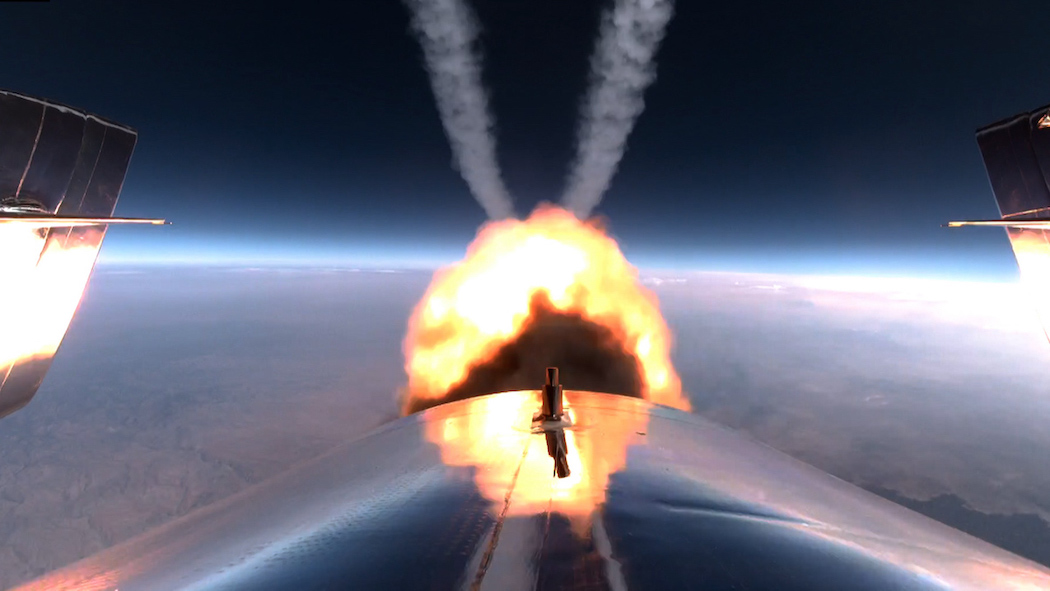STORY WRITTEN FOR CBS NEWS & USED WITH PERMISSION

Virgin Galactic, buoyed by a successful July 11 suborbital test flight with founder Richard Branson on the company’s winged rocket plane, re-opened ticket sales Thursday for rides to space starting at $450,000 per seat.
Michael Colglazier, CEO of Virgin Galactic, also revealed that fully commercial flights are not expected until the third quarter of 2022, after two more test flights of the company’s VSS Unity spaceplane and extensive upgrades of Virgin’s Eve carrier jet to improve durability and turnaround times between flights.
While the start of commercial operations will come a few months later than had been hoped, the results of two piloted test flights earlier this year, including Branson’s July 11 trip to space, show the company is close to “completing our test flight program and launching commercial passenger service in ’22,” Colglazier said.
“And as we advance towards that goal, we are excited to announce today that we will immediately open ticket sales to our significant list of early hand raisers, prioritizing our spacefarer community who, as promised, will be given first opportunity to reserve their place to space.”
He said Virgin has developed a “purposeful range of product offerings in order to satisfy the different ways people were want to share this experience.”
“For the private astronaut flights, our products will include a single seat, a multi-seat couples, families and friends package and a full-flight buyout,” he said. “Prices for this next phase of private astronaut sales will begin at $450,000 per seat. Microgravity research and professional astronaut training flights remain priced at $600,000 on a per seat equivalent basis.”
More than 600 space enthusiasts made down payments on flights much earlier in the program, back when tickets were thought to be in the neighborhood of $250,000 per seat. The prices announced Thursday presumably will apply to new customers only.
How the “early hand raisers” will be accommodated is not yet known, but Colglazier promised to prioritize the waiting list to give them early opportunities to fly.
“We are not just watching history be made, we are making it happen together,” Virgin tweeted. “Thank you for joining us on this journey into the next era of space travel. We invite you to visit our website to register for updates and future ticket information.”
We are not just watching history be made, we are making it happen together. Thank you for joining us on this journey into the next era of space travel. We invite you to visit our website to register for updates and future ticket information: https://t.co/5UalYTpiHL. pic.twitter.com/eZ2cEDPpQS
— Virgin Galactic (@virgingalactic) August 5, 2021
Virgin Galactic is competing with Blue Origin, owned by Amazon-founder Jeff Bezos, to sell sub-orbital up-and-down flights to the edge of space to wealthy space tourists, national space agencies and research institutions. Both companies also will launch automated or human-tended microgravity research payloads.
Virgin Galactic has launched four piloted test flights, the most recent coming on July 11 when the VSS Unity spaceplane, making its 22nd flight overall, carried Branson, two pilots and three company employees above the 50-mile-high altitude recognized by the FAA and NASA as the “boundary” between space and the discernible atmosphere.
Blue Origin launched its more traditional New Shepard rocket and capsule on 14 unpiloted test flights, all of them successful, before sending passengers aloft for the first time, including Bezos, on July 20.
Two more New Shepard launches are planned later this year, both presumably carrying paying customers. Blue Origin ticket prices have not been revealed.
Virgin plans its next flight, Unity 23, in late September, carrying a complement of Italian air force personnel, before standing down for several months to upgrade the Eve carrier jet to improve its durability and shorten the turnaround time between flights. At the same time, the company plans to begin flight testing another spaceplane, the VSS Imagine.
“We expect Eve to complete its enhancement program around mid year 2022,” Colglazier said. “In early Q3, Imagine is planned to begin (glide) flight testing and Unity 24 will fly a full crew of mission specialists to confirm the cabin interior adjustments are functioning as planned. Unity 25, our first commercial private astronaut fight is planned for late Q3.”
